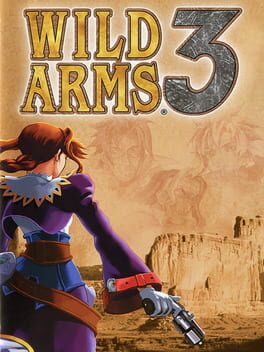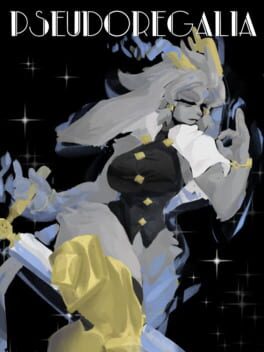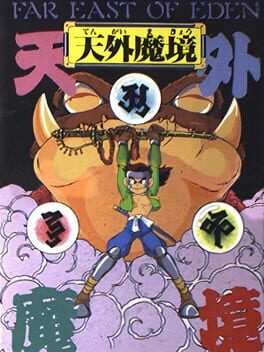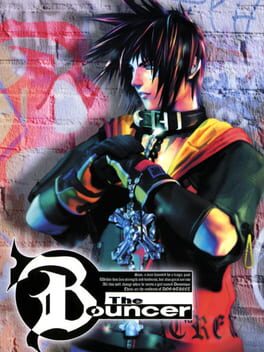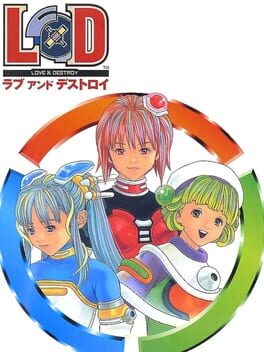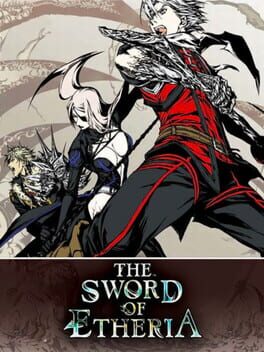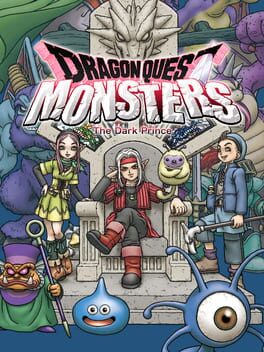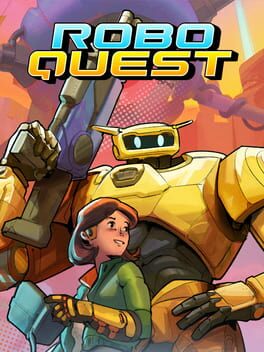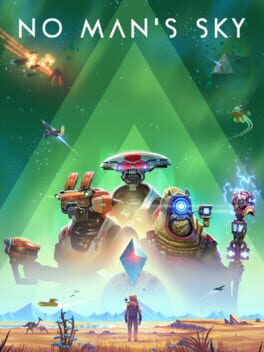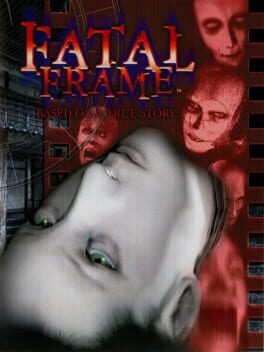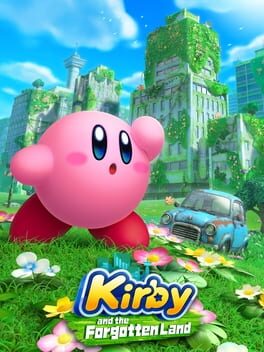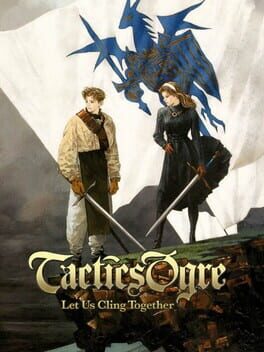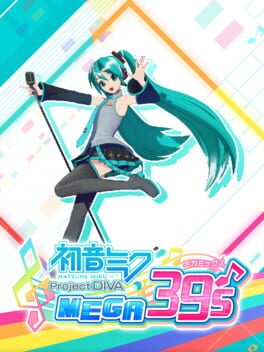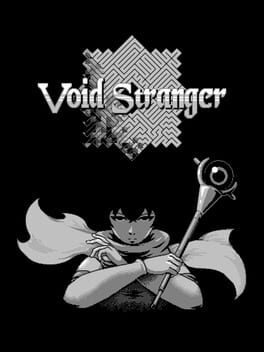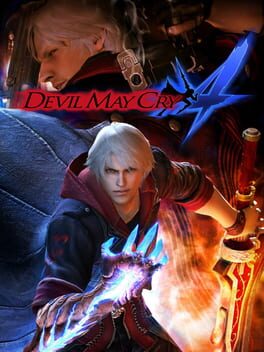DolorousWthVines
BACKER
2002
This was fun. Enjoyable characters, good combat system (I like when RPGs decide to not actually be about resource management, and adapt their mechanics accordingly), great style and visuals, and a fun silly overcomplicated plotline.
It mostly suffers from trying to be a bit too big for its own framework. The attempt to be big scale, yet "episodic", is laudable, but there's just not enough... stuff... mechanics... bits... in the game to make a 40 hour runtime, with multiple interlocking plotlines, not drag on a mechanical level. Even though the dungeons provide some pretty fun small puzzles.
Like, honestly, if this was split into three separate games it would have felt a lot better to play through.
P.S: The search system in the overworld is awful. I hate it. It's a small bit of the game but also, like, why.
P.P.S: I wish these games went a bit harder with the Western theming writing-wise. Like, the aesthetics are there, but often the theming feels more like a gimmicky set-dressing over very rpg-y games and stories, rather than an earnest attempt at capturing the Western genre. Which is fine, I don't even care much about Western movies other than The Trilogia Del Dollaro. But i think this would have been a way funnier game if Virginia was a Clint Eastwood-like antihero.
P.P.P.S: I'm claiming Virginia on behalf of the trans community. She is trans now. No taksie backsies.
It mostly suffers from trying to be a bit too big for its own framework. The attempt to be big scale, yet "episodic", is laudable, but there's just not enough... stuff... mechanics... bits... in the game to make a 40 hour runtime, with multiple interlocking plotlines, not drag on a mechanical level. Even though the dungeons provide some pretty fun small puzzles.
Like, honestly, if this was split into three separate games it would have felt a lot better to play through.
P.S: The search system in the overworld is awful. I hate it. It's a small bit of the game but also, like, why.
P.P.S: I wish these games went a bit harder with the Western theming writing-wise. Like, the aesthetics are there, but often the theming feels more like a gimmicky set-dressing over very rpg-y games and stories, rather than an earnest attempt at capturing the Western genre. Which is fine, I don't even care much about Western movies other than The Trilogia Del Dollaro. But i think this would have been a way funnier game if Virginia was a Clint Eastwood-like antihero.
P.P.P.S: I'm claiming Virginia on behalf of the trans community. She is trans now. No taksie backsies.
2023
I would like to reccomend this because of its insanely cool platforming, which perfectly plays off those "unwieldy" vibes from early 3d platformers and supercharges them with Celeste-level wall-jump craziness; But the main character is a mostly naked anthropomorphic bunny with the thiccest thighs the artist could conceivingly model within the costraits of the haunting low-poly psx nostalgia visual style of the game, so now it's a bit embarrassing to go "hey check out this!".
It feels like everyone making games has suddenly become 200% more horny, while I wasn't looking. It was a bad enough experience when that happened to all of my peers during adolescence, and I don't like it happening again.
The only accessibility option being "Give Sybil pants" made me chukle tho. I have a friend named Sybil, and I am not sure if she would enjoy being given pants.
Anyhow the game is really good. Even tho there's one piece of the soundtrack that reminds me of Dark Souls 2.
EDIT: my one nitpick is that combat feels like an entirely vestigial accessory in the game, and YET the final boss is a straightforward combat challenge. Just feels weird to cap off the game with completely unrelated to what the player has mostly engaged with so far (jumping) for no thematic payoff.
It feels like everyone making games has suddenly become 200% more horny, while I wasn't looking. It was a bad enough experience when that happened to all of my peers during adolescence, and I don't like it happening again.
The only accessibility option being "Give Sybil pants" made me chukle tho. I have a friend named Sybil, and I am not sure if she would enjoy being given pants.
Anyhow the game is really good. Even tho there's one piece of the soundtrack that reminds me of Dark Souls 2.
EDIT: my one nitpick is that combat feels like an entirely vestigial accessory in the game, and YET the final boss is a straightforward combat challenge. Just feels weird to cap off the game with completely unrelated to what the player has mostly engaged with so far (jumping) for no thematic payoff.
Structurally this is basically a Dragon Quest. You walk around, fight some random battles, get into shenanigans, fight the big bads etc. etc.
Would be pretty average if not for the fantastic visuals, that make full use of the PC Engine CD capabilities, and a definite charm in its folkloristic setting.
It never really rises past being a cutesy kids' cartoon in rpg form, but if anything it's at least a pretty cool piece of video game history.
Would be pretty average if not for the fantastic visuals, that make full use of the PC Engine CD capabilities, and a definite charm in its folkloristic setting.
It never really rises past being a cutesy kids' cartoon in rpg form, but if anything it's at least a pretty cool piece of video game history.
2000
This game is kinda rubbish. It feels like someone trying to recall Final Fantasy VII while drunk, and also while never having played Final Fantasy VII.
That said it's a triumph of maximalist late 90s/early 00s style. It's basically the last great psx game, and it's not even on the psx. It's as if someone had made a game out of the tribal-tattoo-design gba, but with more FMV.
Also, the combat is less bad than people say. Like it's STILL fairly bad, but I've played worse.
That said it's a triumph of maximalist late 90s/early 00s style. It's basically the last great psx game, and it's not even on the psx. It's as if someone had made a game out of the tribal-tattoo-design gba, but with more FMV.
Also, the combat is less bad than people say. Like it's STILL fairly bad, but I've played worse.
1999
The actual shooting is fairly mindless, but the game is filled with great Digimon-core aesthetics, and the thing where you walk around a city with your giant robot and as you do you destroy buildings all around you would have blown my 8-years-old mind if I had played it at the time.
Solid fun. Plus it's only like, one hour long. Which I can appreciate.
It was never translated, but it's perfectly playable without knowing Japanese. You miss some of the date-y relationship-y story choices, but everything is still pretty readable from the anime FMVs (which are fairly cool too)
Solid fun. Plus it's only like, one hour long. Which I can appreciate.
It was never translated, but it's perfectly playable without knowing Japanese. You miss some of the date-y relationship-y story choices, but everything is still pretty readable from the anime FMVs (which are fairly cool too)
2005
A clunky shonen-y Wizard of Oz meets Paradise Lost meets Kingdom Hearts kinda action game with one (1) mechanic that gets squeezed for as much value as possible in the 7 hours of its runtime.
You bounce enemies around with your one combo, charge your special attack meter, and then use the special attack on whatever is the puzzle-like thing that needs to be special attacked in this level. And then you do it a bunch more, with slight variations, until you get through all the 19 levels. (I like the bit where you have to use your one throwy combo to feed enemies to giant worms. Highlight of the game together with that one late-game enemy that rides a lil scooter around)
Kind of a bad game tbh, but I enjoyed it well enough. The character designs are good, and the combat doesn't require much thinking, so y'know, it's cool. Good game to play while sick.
You bounce enemies around with your one combo, charge your special attack meter, and then use the special attack on whatever is the puzzle-like thing that needs to be special attacked in this level. And then you do it a bunch more, with slight variations, until you get through all the 19 levels. (I like the bit where you have to use your one throwy combo to feed enemies to giant worms. Highlight of the game together with that one late-game enemy that rides a lil scooter around)
Kind of a bad game tbh, but I enjoyed it well enough. The character designs are good, and the combat doesn't require much thinking, so y'know, it's cool. Good game to play while sick.
I've never seen a modern 3D rpg replicate so perfectly the vibes of, like, random mid-tier Game Boy rpgs like Robopon or Legend of The River King. From the extremely abstracted, yet somehow small and isolated, environments, to the wordy yet breezy and somewhat hollow structure of the game itself, which mainly exists just to prop up the excellent monster battler mechanics. All those are vibes that I thought were lost to time, and seeing them resurface here put a nostalgic smile on my face.
To be fair, this stuff can either be good or bad depending on your tastes. It can maybe come off as cheap in what's supposed to be a "modern 3d game for grown ups". But, like, it is definitely a very Distinct vibe, and you gotta at least respect it for that.
I didn't really want to stick with it for 40 hours. Which is also true of a lot of those mid-tier game boy rpgs it reminds me of. But what I've played I enjoyed thoroughly. Which is also true of a lot of those mid-tier game boy rpgs it reminds me of.
To be fair, this stuff can either be good or bad depending on your tastes. It can maybe come off as cheap in what's supposed to be a "modern 3d game for grown ups". But, like, it is definitely a very Distinct vibe, and you gotta at least respect it for that.
I didn't really want to stick with it for 40 hours. Which is also true of a lot of those mid-tier game boy rpgs it reminds me of. But what I've played I enjoyed thoroughly. Which is also true of a lot of those mid-tier game boy rpgs it reminds me of.
2020
Solid rogue-lite. I was expecting something Borderlands-y, but i was pleasantly surprised by how, instead, it's way more of a fast movement-oriented game.
My only nitpick so far is that the unique skills available to most of the classes seem to only offer additional offensive tools, rather than providing other kinds of support. I always end up using the starting class, because its shield ability feels like it actually increases my general agency on the play. While I rarely feel like I need Other ways to deal damage to enemies.
My only nitpick so far is that the unique skills available to most of the classes seem to only offer additional offensive tools, rather than providing other kinds of support. I always end up using the starting class, because its shield ability feels like it actually increases my general agency on the play. While I rarely feel like I need Other ways to deal damage to enemies.
2016
I understand that it's a fun game loop, but every time I land on a lush, beautiful, alien environment, and my first and more prominent form of interacting with it is mining giant holes in it and shooting at flowers with a laser gun, I feel like I'm the bad guy from Avatar. I constantly expect a Na'vi to come and beat the shit out of me any second whenever I'm playing this.
2001
Scattered thoughts:
• While I love awkward American voice acting in ps1/ps2-era games as much as the next person, I don't know if it really helps this game. Sure, the overall haunted mansion premise doesn't lack some elements of cheese, but the game overall tries to treat itself fairly seriously, and I feel in many places the American voice acting ends up undermining that tone.
• Ghosts are not a theme as used in games as other horror classics, mainly because they're a generally intangible threat that's difficult to design combat around. Fatal Frame solves that problem in the most video game way possible, by pretty much allowing you to shoot ghosts in the face. Even the Winchesters had to do at least a bit of thinking to get rid of ghosts. Little Miku just shoots them in the face with a camera. Sure. Why not.
• If anything though, the combat has a solid play aesthetic that gives it its own identity. While the exploration and the combat happen in a continuum, with no hard boundaries between them, the radical shift between the two, almost gives them a jrpg-like quality. It Feels like I'm transitioning in and out of a different play-space when I initiate and finish combat in Fatal Frame. In games like Resident Evil combat feels like it punctuates the exploration, In Fatal Frame, due to a number of reasons (More mechanically involved, fewer bigger enemies, many situations where combat locks you out of exploration), it feels like it's kind of its own thing.
• I'm not sure what the upgrade system adds to the game. Systems like that are usually used to give an empowering feeling, give a sense of progression, or incentivize repeated combat, and I don't think any of those are things you would have really wanted in this kind of game (I guess the sense of progression would fit, but the game is not really long enough to really feel like it needs systemized progression). Like, I feel like the appeal of this kind of horror is, to an extent, the feeling of helplessness it can evoke, and going into a menu to make my camera shoot special bullets always took me a bit out of it.
• Ghost stories, in other media, are usually 70% based around the protagonist not knowing that ghosts are a thing. Fatal Frame is like "ok ghosts are real and you kill them with this camera" like three minutes in. You have to do that, cause you need to tutorialize and show off your core gameplay. Is it good? I don't know, I'd like to stop assuming that the way other media do things is always the correct one. It surely doesn't get in the way of anything the game is trying to do, although that's mostly because what the game is trying to do doesn't stray very far from pulpy, vaguely shlocky, scares.
• They clearly had to do the most with their time/budget, so the game is set in a fairly small mansion, and the environments are re-visited a lot. It's mostly ok, and the mechanic associated with the key and lock system of this game is pretty clever. But the second-to-last chapter kinda becomes Zelda, and it lost me. They also have, like, exactly 3 kinds of puzzles in the whole game, that also get repeated a Lot. Again, it's fine, you do what you gotta do, but it's pretty funny how many doors in this mansion are locked by sliding puzzles.
• There are a couple of bits where the big evil ghost gets the protagonist, and they could have easily been cutscenes, but instead they let you play them briefly so you can actually feel overwhelmed by how strong the strong ghost is. I like that. It's not executed perfectly but I like that.
• I was Really not expecting how pro human-ritual-sacrifices the ending is lol
• It's honestly really cool to see fixed camera gameplay mixed with first-person elements. This is definitely not the first game ever to do that (Metal Gear Solid already had some first person stuff back in 98), but there's definitely Something in integrating those elements with horror theming and silent hill/resident evil gameplay. Like entering a room featuring an adverse camera angle, switching to camera view to scan the place better, while at the same time narrowing your field of view (more vulnerable), is a surprisingly effective little bit of horror gameplay. The game doesn't Really use that to any particular effect, but still, there's Something engaging there.
Eh, I liked this. It's good.
• While I love awkward American voice acting in ps1/ps2-era games as much as the next person, I don't know if it really helps this game. Sure, the overall haunted mansion premise doesn't lack some elements of cheese, but the game overall tries to treat itself fairly seriously, and I feel in many places the American voice acting ends up undermining that tone.
• Ghosts are not a theme as used in games as other horror classics, mainly because they're a generally intangible threat that's difficult to design combat around. Fatal Frame solves that problem in the most video game way possible, by pretty much allowing you to shoot ghosts in the face. Even the Winchesters had to do at least a bit of thinking to get rid of ghosts. Little Miku just shoots them in the face with a camera. Sure. Why not.
• If anything though, the combat has a solid play aesthetic that gives it its own identity. While the exploration and the combat happen in a continuum, with no hard boundaries between them, the radical shift between the two, almost gives them a jrpg-like quality. It Feels like I'm transitioning in and out of a different play-space when I initiate and finish combat in Fatal Frame. In games like Resident Evil combat feels like it punctuates the exploration, In Fatal Frame, due to a number of reasons (More mechanically involved, fewer bigger enemies, many situations where combat locks you out of exploration), it feels like it's kind of its own thing.
• I'm not sure what the upgrade system adds to the game. Systems like that are usually used to give an empowering feeling, give a sense of progression, or incentivize repeated combat, and I don't think any of those are things you would have really wanted in this kind of game (I guess the sense of progression would fit, but the game is not really long enough to really feel like it needs systemized progression). Like, I feel like the appeal of this kind of horror is, to an extent, the feeling of helplessness it can evoke, and going into a menu to make my camera shoot special bullets always took me a bit out of it.
• Ghost stories, in other media, are usually 70% based around the protagonist not knowing that ghosts are a thing. Fatal Frame is like "ok ghosts are real and you kill them with this camera" like three minutes in. You have to do that, cause you need to tutorialize and show off your core gameplay. Is it good? I don't know, I'd like to stop assuming that the way other media do things is always the correct one. It surely doesn't get in the way of anything the game is trying to do, although that's mostly because what the game is trying to do doesn't stray very far from pulpy, vaguely shlocky, scares.
• They clearly had to do the most with their time/budget, so the game is set in a fairly small mansion, and the environments are re-visited a lot. It's mostly ok, and the mechanic associated with the key and lock system of this game is pretty clever. But the second-to-last chapter kinda becomes Zelda, and it lost me. They also have, like, exactly 3 kinds of puzzles in the whole game, that also get repeated a Lot. Again, it's fine, you do what you gotta do, but it's pretty funny how many doors in this mansion are locked by sliding puzzles.
• There are a couple of bits where the big evil ghost gets the protagonist, and they could have easily been cutscenes, but instead they let you play them briefly so you can actually feel overwhelmed by how strong the strong ghost is. I like that. It's not executed perfectly but I like that.
• I was Really not expecting how pro human-ritual-sacrifices the ending is lol
• It's honestly really cool to see fixed camera gameplay mixed with first-person elements. This is definitely not the first game ever to do that (Metal Gear Solid already had some first person stuff back in 98), but there's definitely Something in integrating those elements with horror theming and silent hill/resident evil gameplay. Like entering a room featuring an adverse camera angle, switching to camera view to scan the place better, while at the same time narrowing your field of view (more vulnerable), is a surprisingly effective little bit of horror gameplay. The game doesn't Really use that to any particular effect, but still, there's Something engaging there.
Eh, I liked this. It's good.
Oh. Wow. This is a good one.
I am generally a bit iffy with Kirby games, as they usually tend to be a bit too chill and homogeneous for me to love, but this almost feels like an in-between point between Kirby and Mario level-design-wise. The challenges and setpieces still offer room for exploration and side-stuff, but they are a lot more discrete and focused than in other Kirby games. It's not a complete turn to Mario-isms, as nothing here comes close to the relentless pace of small discrete challenges of something like Mario Galaxy, but that's a good thing, this game seems to take a lot of good lessons from that kind of level design, without losing what makes Kirby games unique. Just excellent pacing, straight-up a joy to play through.
I don't like all of the side systems. Like, it's incredibly cute that as you save Waddle Dees they build a lil town, but all the systems offered by that town seem a bit superfluous (I think the upgrade system has been done as correctly as an upgrade system can be done in a Kirby game... but still... I Really didn't feel the need of an upgrade system in this game), and kinda take away from the chill, linear platforming adventure experience of the main story. It's ok tho, I completely ignored all that stuff and the game still plays well.
Only other bit I'll critique is that I wish that they had focused in telling this story completely without dialogue. Like, this game is at its narrative best when all these cute critters interact wordlessly, just through gestures and stuff; every time someone started speaking it kinda felt off-vibe.
Also, for some reason, 3D movement makes Kirby seem more violent than the tone really wants him to be. Not sure if it's just me, but throwing bombs in 3D somehow feels a lot more "real" than throwing bombs in 2D. It's just kinda funny. This small pink ball of adorable just murdering a bunch of cute animals by blowing them up.
Anyhow this is very good. A proper fun and chill and vibe-y and memorable game. Leave it to HAL and Nintendo to still be making great 3D platformers in a time when that specific expression of the genre seems to have gone out of fashion.
I am generally a bit iffy with Kirby games, as they usually tend to be a bit too chill and homogeneous for me to love, but this almost feels like an in-between point between Kirby and Mario level-design-wise. The challenges and setpieces still offer room for exploration and side-stuff, but they are a lot more discrete and focused than in other Kirby games. It's not a complete turn to Mario-isms, as nothing here comes close to the relentless pace of small discrete challenges of something like Mario Galaxy, but that's a good thing, this game seems to take a lot of good lessons from that kind of level design, without losing what makes Kirby games unique. Just excellent pacing, straight-up a joy to play through.
I don't like all of the side systems. Like, it's incredibly cute that as you save Waddle Dees they build a lil town, but all the systems offered by that town seem a bit superfluous (I think the upgrade system has been done as correctly as an upgrade system can be done in a Kirby game... but still... I Really didn't feel the need of an upgrade system in this game), and kinda take away from the chill, linear platforming adventure experience of the main story. It's ok tho, I completely ignored all that stuff and the game still plays well.
Only other bit I'll critique is that I wish that they had focused in telling this story completely without dialogue. Like, this game is at its narrative best when all these cute critters interact wordlessly, just through gestures and stuff; every time someone started speaking it kinda felt off-vibe.
Also, for some reason, 3D movement makes Kirby seem more violent than the tone really wants him to be. Not sure if it's just me, but throwing bombs in 3D somehow feels a lot more "real" than throwing bombs in 2D. It's just kinda funny. This small pink ball of adorable just murdering a bunch of cute animals by blowing them up.
Anyhow this is very good. A proper fun and chill and vibe-y and memorable game. Leave it to HAL and Nintendo to still be making great 3D platformers in a time when that specific expression of the genre seems to have gone out of fashion.
Me when seeing the protagonist being framed for war crimes he didn't commit and now a bunch of bounty hunters are on his trail: Fr, just like the time the Winchesters opened the gates of hell, and then a bunch of hunters tried to kill them for it.
But yeah, this is an Important game. As much as I love Matsuno's work this to an extent is still the most accomplished and coherent piece of his ludology. Like, this is an unapologetically Serious game, and also an unapologetically Video Game game, and I think we need more of those. It's a work that feels almost literary, but achieves that status not by aping other mediums, but by taking the whole "being a Video Game"-thing very seriously. Even the fiddliness of the UI, to an extent, seems to contribute to that vibe. I dunno, I like that the menus always take one or two more button presses than you expect. If I was breezing through them because of modern ease-of-use design this game wouldn't hit the same.
But yeah, this is an Important game. As much as I love Matsuno's work this to an extent is still the most accomplished and coherent piece of his ludology. Like, this is an unapologetically Serious game, and also an unapologetically Video Game game, and I think we need more of those. It's a work that feels almost literary, but achieves that status not by aping other mediums, but by taking the whole "being a Video Game"-thing very seriously. Even the fiddliness of the UI, to an extent, seems to contribute to that vibe. I dunno, I like that the menus always take one or two more button presses than you expect. If I was breezing through them because of modern ease-of-use design this game wouldn't hit the same.
This was on sale on Steam at like 60% off, and I hadn't bought anything else this sale and I was like "fuck it, I'm eating popcorn for breakfast, it's not like I have any dignity left to preserve, might as well buy the vocaloid rhytm game"
Anyhow I hate this trend of porting rhythm games from arcades by just dumping a bunch of songs on console and calling it a day. Let me go through a bare-bone "story mode" to unlock the song, please! Give my existence on this earth at least a semblance of meaning. I had the same problem with Voez, which is a game that I otherwise love, but I just lose interest in playing, without the game telling me which song should I play and when. Theathrytm is truly the only one that Gets It.
I'm s also not the biggest fan of how each song is structured to have a single huge difficulty spike near the end. Like, the first 2-3 minutes of each song kinda feel like a Dark Souls boss-run. It's kinda nerve-wrecking when you're trying to get perfect combos to have to wait so long before being able to re-try the Actually Difficult bit.
Aside from that, this is perfectly fine at doing what it's meant to do. It's bright and colourful and the music videos have some fun choreographies. Most of the music is a bit too quirky for me, but there's a couple of tracks even I can't help but appreciate.
Anyhow I hate this trend of porting rhythm games from arcades by just dumping a bunch of songs on console and calling it a day. Let me go through a bare-bone "story mode" to unlock the song, please! Give my existence on this earth at least a semblance of meaning. I had the same problem with Voez, which is a game that I otherwise love, but I just lose interest in playing, without the game telling me which song should I play and when. Theathrytm is truly the only one that Gets It.
I'm s also not the biggest fan of how each song is structured to have a single huge difficulty spike near the end. Like, the first 2-3 minutes of each song kinda feel like a Dark Souls boss-run. It's kinda nerve-wrecking when you're trying to get perfect combos to have to wait so long before being able to re-try the Actually Difficult bit.
Aside from that, this is perfectly fine at doing what it's meant to do. It's bright and colourful and the music videos have some fun choreographies. Most of the music is a bit too quirky for me, but there's a couple of tracks even I can't help but appreciate.
2023
A Puzzle Box of Puzzles.
I still can't quite figure out if this game's merging of scattered post-modern storytelling and very concrete puzzle mechanics fully works. On one hand, the immediate and constant rewards from solving the very video-game-y Sokoban puzzles helps to keep the player's attention as they try to figure out the more meta aspects of the puzzle box. On the other hand, I'm really not sure I want to play hours of Sokoban-adjacent levels, for how creative they are, every time I want to try something.
I played enough of this to know what's up with it. And watched a bunch more on YouTube for good measure. But I don't think I'll go back to it to do the full 100%. I really appreciate how detailed and intricate the game is, and how it lays out its puzzle box, but be it because, as much as I love tile-based puzzles, I can only take so much of them, or because the narrative, despite being interestingly told, felt a bit hollow, I really did not resonate much with it.
It's very deliberately a Lore Game, but it's less Dark Souls and more Shonen. It's all about quirky characters and small tear-jerky parables. Not Terrible in its own right, but eventually I started feeling that I was doing a huge amount of work to piece together a narrative that didn't quite match up tonally with that effort.
Immaculate vibes. Lots of great and detailed work. Really good puzzles. Dozens of anatomically preposterous breasts. I get why people love this thing, and I can appreciate a lot of what it does, but ultimately it just kinda left me cold.
It's a Zoomer game it's what it is. I think I'm just too old for Void Stranger. It's like whatever the jester thing people keep posting on twitter is.
I still can't quite figure out if this game's merging of scattered post-modern storytelling and very concrete puzzle mechanics fully works. On one hand, the immediate and constant rewards from solving the very video-game-y Sokoban puzzles helps to keep the player's attention as they try to figure out the more meta aspects of the puzzle box. On the other hand, I'm really not sure I want to play hours of Sokoban-adjacent levels, for how creative they are, every time I want to try something.
I played enough of this to know what's up with it. And watched a bunch more on YouTube for good measure. But I don't think I'll go back to it to do the full 100%. I really appreciate how detailed and intricate the game is, and how it lays out its puzzle box, but be it because, as much as I love tile-based puzzles, I can only take so much of them, or because the narrative, despite being interestingly told, felt a bit hollow, I really did not resonate much with it.
It's very deliberately a Lore Game, but it's less Dark Souls and more Shonen. It's all about quirky characters and small tear-jerky parables. Not Terrible in its own right, but eventually I started feeling that I was doing a huge amount of work to piece together a narrative that didn't quite match up tonally with that effort.
Immaculate vibes. Lots of great and detailed work. Really good puzzles. Dozens of anatomically preposterous breasts. I get why people love this thing, and I can appreciate a lot of what it does, but ultimately it just kinda left me cold.
It's a Zoomer game it's what it is. I think I'm just too old for Void Stranger. It's like whatever the jester thing people keep posting on twitter is.
2008
I was looking at the recent Capcom Steam Sales, and I saw Devil May Cry 4 for quite cheap, and I realized I never actually played it before. I remember reviews at the time being quite unenthusiastic about it, so I ended up skipping it and then promptly forgetting that it ever existed, as just a year later Bayonetta would pretty much re-invent the genre. But like, I don't have anything better to do nowadays, so I figured I might as well give it a go.
1. It really annoys me that the only version of the game readily available digitally is the "Special Edition". Especially because apparently the original version had some pretty significant differences in the combat, and it is now extremely difficult to find any information about such differences, as they don't seem to be accurately documented anywhere. The original version of the game only existed physically as far as I can tell (or at least has eventually been delisted from consoles' digital stores), so, like, this kinda sucks. Like I get that most people would almost always want to play the "better" version, but like, I dunno, shit like this always feels like history is being eroded away.
2. Talking about history, this game is positioned in a very interesting place in time. As mentioned, Bayonetta will be released about a year after DMC4, and it will rejuvenate the genre by cutting out all of the vestigial remnants of Resident Evil-like horror-adventure that it was still carrying, coining the signature Platinum Games-style which focused on faster-paced cinematic-adjacent setpieces. At the same time by 2008, the fixed-camera adventure style of Resident Evil games was long gone, replaced by on-rail shooter spinoffs and whatever Resident Evil 5 ended up being. So... the fact that DMC4 released Before the genre was stripped of its Resident Evil-elements, still proudly carrying along clunky puzzles and gothic locales explored through a (mostly) fixed camera, makes it, in a way, the closer thing that we ever had to a new old-style Resident Evil on HD consoles. I mean, it's still very much an action game for most of its length, and those elements are relatively minor (especially when compared with the first Devil May Cry), but still, sometimes, when the pace slows down and it's kinda confusing to figure out where to go next, it definitely gives some unique and fascinating anachronistic vibes.
3. I know at the time people were annoyed by the game introducing a new main character, but Nero is honestly very fun. I think they should release a Super Special edition where Simple Plan's "I'm Just a Kid" starts playing whenever something bad happens to him. He's such a loser and I love him.
4. Nero plays pretty well too. The buster grapples definitely feel like a concession to the more mainstream/less technical/more cinematic wave of action games like God of War and Heavenly Sword, and I could take it or leave it; but on the other hand, the Snatch ability feels great and speeds up the pace of combat a lot and his combos are different enough from Dante's that yeah, he's just pretty fun to play.
5. I have not played DMC5 yet, but so far DMC4 has hands down the best writing for Dante in the series. I'm So here for goofy aged-up Dante. I like how as the game opens they make him look like this brooding dangerous threat, and then as soon as you get to his half of the game he's just doing silly shit. Each of his cutscenes is a delight.
6. Look, as mentioned, it's hilarious when Nero gets his ass kicked. But if I win a boss fight he should not be then get his ass kicked in the next cutscene! That's against the rules! There's ways around it!
7. I have zero idea what was The Order's actual plan. But that's ok. I'm pretty sure the writer didn't know either.
8. Look I get that this game notoriously had a mildly troubled development and is generally considered "incomplete", but like, I dunno, I feel like they actually did an excellent job wrapping it with the resources they had. Like, yeah, there are some repeated enemy models, but the "powered-up" enemies always have enough interesting new attacks to make them a very different challenge from their alternate type. And yeah, all of Dante's levels use the same environments as Nero's one, but they also feature some great economic level design that makes them feel snappier, faster (playing into the theme of Dante being mostly above all this shit at this point), and generally different. Like yeah, they probably ran out of resources, but they also did a great job in using, and recontextualizing, what they had to finish up the game. So like, I think that's neat.
But yeah, I enjoyed this. It's a silly action game with some extremely fun combat, from the weird in-between era of video games, also known as 2005-2013. Like, it's no Bayonetta, but not many things are. It's pretty ok, solidly ok even, the Itadaki Street Boss Rush was super ass, I had fun, the end.
1. It really annoys me that the only version of the game readily available digitally is the "Special Edition". Especially because apparently the original version had some pretty significant differences in the combat, and it is now extremely difficult to find any information about such differences, as they don't seem to be accurately documented anywhere. The original version of the game only existed physically as far as I can tell (or at least has eventually been delisted from consoles' digital stores), so, like, this kinda sucks. Like I get that most people would almost always want to play the "better" version, but like, I dunno, shit like this always feels like history is being eroded away.
2. Talking about history, this game is positioned in a very interesting place in time. As mentioned, Bayonetta will be released about a year after DMC4, and it will rejuvenate the genre by cutting out all of the vestigial remnants of Resident Evil-like horror-adventure that it was still carrying, coining the signature Platinum Games-style which focused on faster-paced cinematic-adjacent setpieces. At the same time by 2008, the fixed-camera adventure style of Resident Evil games was long gone, replaced by on-rail shooter spinoffs and whatever Resident Evil 5 ended up being. So... the fact that DMC4 released Before the genre was stripped of its Resident Evil-elements, still proudly carrying along clunky puzzles and gothic locales explored through a (mostly) fixed camera, makes it, in a way, the closer thing that we ever had to a new old-style Resident Evil on HD consoles. I mean, it's still very much an action game for most of its length, and those elements are relatively minor (especially when compared with the first Devil May Cry), but still, sometimes, when the pace slows down and it's kinda confusing to figure out where to go next, it definitely gives some unique and fascinating anachronistic vibes.
3. I know at the time people were annoyed by the game introducing a new main character, but Nero is honestly very fun. I think they should release a Super Special edition where Simple Plan's "I'm Just a Kid" starts playing whenever something bad happens to him. He's such a loser and I love him.
4. Nero plays pretty well too. The buster grapples definitely feel like a concession to the more mainstream/less technical/more cinematic wave of action games like God of War and Heavenly Sword, and I could take it or leave it; but on the other hand, the Snatch ability feels great and speeds up the pace of combat a lot and his combos are different enough from Dante's that yeah, he's just pretty fun to play.
5. I have not played DMC5 yet, but so far DMC4 has hands down the best writing for Dante in the series. I'm So here for goofy aged-up Dante. I like how as the game opens they make him look like this brooding dangerous threat, and then as soon as you get to his half of the game he's just doing silly shit. Each of his cutscenes is a delight.
6. Look, as mentioned, it's hilarious when Nero gets his ass kicked. But if I win a boss fight he should not be then get his ass kicked in the next cutscene! That's against the rules! There's ways around it!
7. I have zero idea what was The Order's actual plan. But that's ok. I'm pretty sure the writer didn't know either.
8. Look I get that this game notoriously had a mildly troubled development and is generally considered "incomplete", but like, I dunno, I feel like they actually did an excellent job wrapping it with the resources they had. Like, yeah, there are some repeated enemy models, but the "powered-up" enemies always have enough interesting new attacks to make them a very different challenge from their alternate type. And yeah, all of Dante's levels use the same environments as Nero's one, but they also feature some great economic level design that makes them feel snappier, faster (playing into the theme of Dante being mostly above all this shit at this point), and generally different. Like yeah, they probably ran out of resources, but they also did a great job in using, and recontextualizing, what they had to finish up the game. So like, I think that's neat.
But yeah, I enjoyed this. It's a silly action game with some extremely fun combat, from the weird in-between era of video games, also known as 2005-2013. Like, it's no Bayonetta, but not many things are. It's pretty ok, solidly ok even, the Itadaki Street Boss Rush was super ass, I had fun, the end.
